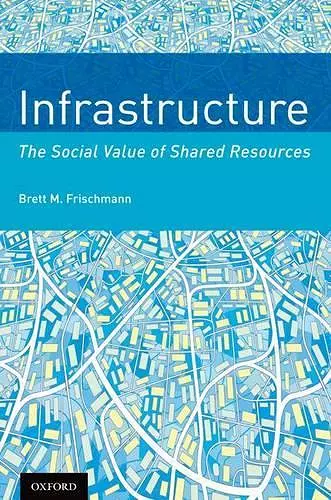Infrastructure
The Social Value of Shared Resources
Format:Paperback
Publisher:Oxford University Press Inc
Published:17th Jan '13
Currently unavailable, and unfortunately no date known when it will be back
This paperback is available in another edition too:
- Hardback£125.00(9780199895656)

Infrastructure resources are the subject of many contentious public policy debates, including what to do about crumbling roads and bridges, whether and how to protect our natural environment, energy policy, even patent law reform, universal health care, network neutrality regulation and the future of the Internet. Each of these involves a battle to control infrastructure resources, to establish the terms and conditions under which the public receives access, and to determine how the infrastructure and various dependent systems evolve over time. Infrastructure: The Social Value of Shared Resources devotes much needed attention to understanding how society benefits from infrastructure resources and how management decisions affect a wide variety of interests. The book links infrastructure, a particular set of resources defined in terms of the manner in which they create value, with commons, a resource management principle by which a resource is shared within a community. The infrastructure commons ideas have broad implications for scholarship and public policy across many fields ranging from traditional infrastructure like roads to environmental economics to intellectual property to Internet policy. Economics has become the methodology of choice for many scholars and policymakers in these areas. The book offers a rigorous economic challenge to the prevailing wisdom, which focuses primarily on problems associated with ensuring adequate supply. The author explores a set of questions that, once asked, seem obvious: what drives the demand side of the equation, and how should demand-side drivers affect public policy? Demand for infrastructure resources involves a range of important considerations that bear on the optimal design of a regime for infrastructure management. The book identifies resource valuation and attendant management problems that recur across many different fields and many different resource types, and it develops a functional economic approach to understanding and analyzing these problems and potential solutions.
It is a rich book that neither ducks from challenging the disciplinary boundaries of economic theory nor from complex issues of spillover effects or hard-to-measure externalities. Frischmanns contribution includes the grand task of comparing and analysing the very much different types of infrastructurestransportations, telecommunications, environmental, intellectualin terms of managing commons. * Stefan Larsson, International Journal for the Semiotics of Law *
Brett Frischmanns book is an important contribution to enhancing our understanding of the fundamental resources that shape our economic, social, and political opportunities. ... Most importantly, the books contribution lies in linking shared infrastructure resources we rely on daily, with a particular management regime that is capable of generating and maintaining the maximum social value within a community on nondiscriminatory terms. * Rustam Romaniuc, International Review of Economics *
ISBN: 9780199975501
Dimensions: 231mm x 155mm x 18mm
Weight: 499g
436 pages